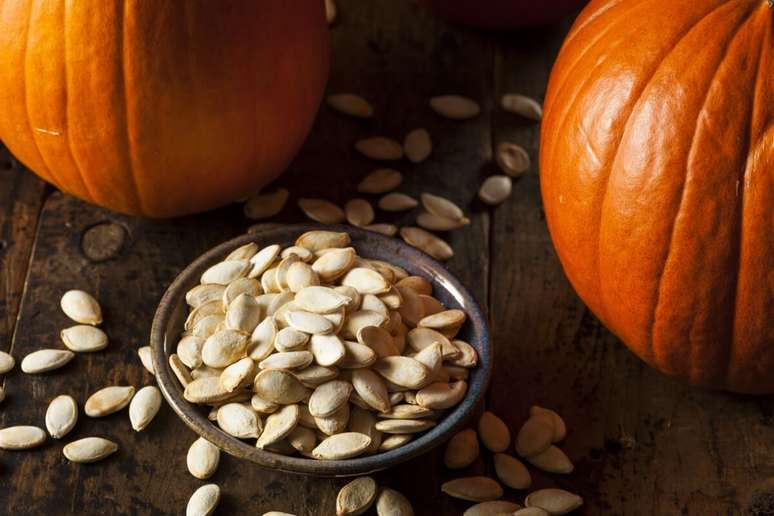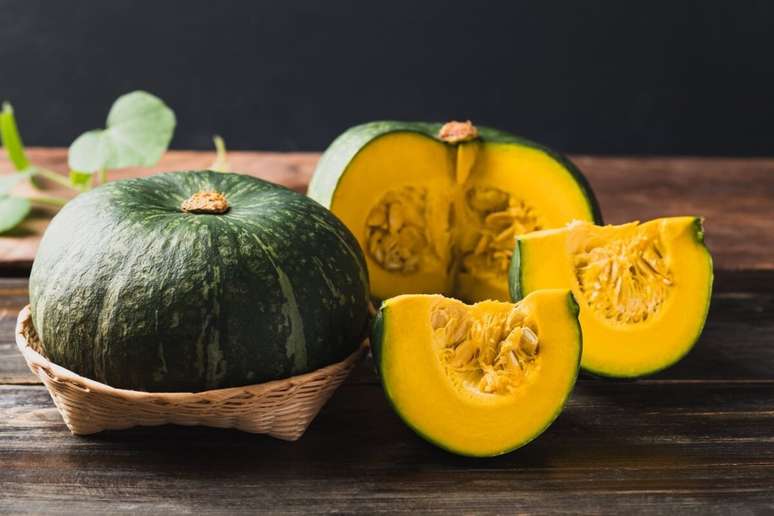In addition to being versatile and tasty, it helps prevent diseases and promotes the correct functioning of the body.
Rich in essential nutrients and very tasty, pumpkin is a versatile ingredient, native to the Americas and widely appreciated in different cultures around the world. In Brazil, the most consumed types are Japanese pumpkin, strawberry pumpkin and neck pumpkin. Each has unique flavor and texture characteristics and can be used in sweet and savory recipes.
With an impressive nutritional profile, pumpkin is an excellent source of vitamins, minerals and antioxidants, making it a powerful health ally. Below, take a look at some of its benefits!
1. Strengthens the immune system
Pumpkin is rich in it vitamin C and beta-carotene, compounds that help boost immunity and protect the body from infections. “Vitamin C acts directly on our defense cells and helps fight pathogenic microorganisms, strengthening our antibodies,” adds pharmacist Luciana Rocha. Beta-carotene, in turn, converts to vitamin A, which also plays an important role in immune health.
2. Contributes to cardiovascular health
Pumpkin contains fiber, potassium and antioxidants that help reduce blood pressure and the risk of cardiovascular disease. Regular consumption of potassiumfor example, it is associated with a lower incidence of hypertension, as well as promoting the regulation of heartbeats.
According to a study published in European Heart Journaljournal of the European Society of Cardiology, in July 2022, potassium consumption was associated with greater health improvements in women.
“The findings suggest that potassium helps maintain heart health, but women benefit more than men. The relationship between potassium and cardiovascular events was the same regardless of salt intake, suggesting that potassium has other forms to protect the heart, as well as increase sodium excretion,” explains nephrologist Dr. Caroline Reigada.
3. Pumpkin helps regulate digestion
With good quantities of fibers dietary, pumpkin is excellent for promoting the health of the digestive system. This is because they help regulate intestinal transit and prevent constipation. Additionally, a high-fiber diet is associated with a lower risk of developing diseases such as colon cancer.
“The fibers present in foods help keep the body in balance. They absorb excess and help eliminate toxins. They prevent constipation and intestine-related diseases, help lose weight and prevent cardiovascular diseases”, explains the nutritionist Fernanda Sobral.
4. Promotes healthy skin
The antioxidants and vitamins found in pumpkin, such as vitamin C and E, help keep skin healthy, delaying premature aging and protecting it from damage caused by free radicals. They also help keep the skin hydrated and elastic.

5. Pumpkin contributes to mental health
Pumpkin seeds are a natural source of tryptophanan amino acid that contributes to the production of serotonin and melatonin, hormones that regulate mood and sleep. According to Alessandro Mascarenhas, professor of the Nutrition course at the Faculdade Anhanguera, a lack of essential nutrients, such as tryptophan, can also contribute to insomnia.
6. Helps control blood sugar
Pumpkin and its seeds can help control blood glucose levels. The bioactive compounds present in this food help increase and reduce insulin production glucose absorption in the intestine.
Nutritionist Fernanda Sobral says the slower release of glucose into the blood results in “less release of insulin, a hormone that ‘brings’ glucose into the cells for use and promotes the storage of fats when they are in large quantities.”
7. Promotes eye health
The beta-carotene present in pumpkin is transformed in the body into vitamin A, an essential nutrient for eye health. Vitamin A prevents macular degeneration and cataracts, as well as improving night vision, making it an excellent ally for keeping eyes healthy over time.
Creative ways to consume pumpkin
Pumpkin can be incorporated into various dishes and preparations, both in traditional recipes and in more modern versions. Check out some tips on how to use it in everyday life:
- Soups and broths: cook the pumpkin with the spices and blend it in a blender until you obtain a creamy soup.
- Pumpkin puree: as an accompaniment to second courses, replacing mashed potatoes.
- Bread and sweets: Add cooked and mashed pumpkin to bread and cake mixes to give it a special touch.
- Sweet and savory cakes: use pumpkin as a filling or base for tarts.
- Seed snacks: Toast the seeds with salt and seasoning for a nutritious, crunchy snack.
- Smoothies: Mix cooked pumpkin with yogurt, honey, and spices like cinnamon for a healthy drink.
Source: Terra
Ben Stock is a lifestyle journalist and author at Gossipify. He writes about topics such as health, wellness, travel, food and home decor. He provides practical advice and inspiration to improve well-being, keeps readers up to date with latest lifestyle news and trends, known for his engaging writing style, in-depth analysis and unique perspectives.







